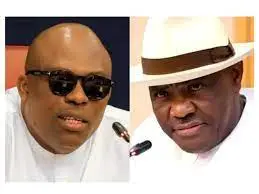By Daniel Edu
In a bid to resolve the political crisis in Rivers State, Governor Siminalayi Fubara has committed to implementing the agreements brokered by President Bola Tinubu at the Presidential Villa in Abuja. The peace deal, which includes the withdrawal of the impeachment notice against Governor Fubara by the group of 27 lawmakers (G27) who defected from the Peoples Democratic Party (PDP) to the All Progressives Congress (APC), aims to restore stability in the state.
Key developments include:
1. *Impeachment Notice Withdrawn:* The G27 lawmakers, led by Speaker Martin Amaewhule, withdrew the impeachment notice against Governor Fubara in compliance with the resolutions reached during the peace talks in Abuja.
2. *Legal Proceedings:* Despite the withdrawal of the impeachment notice, legal proceedings related to the matter faced complications in court. The court directed the claimant’s counsel to consult with the client regarding the withdrawal of the case.
3. *Reaction from Ijaw Youth Council:* The Ijaw Youth Council (IYC) and other Niger Delta groups rejected the peace agreement, describing it as a “rape of democracy” and displaying open hostility toward the Ijaw people. They emphasized concerns about the one-sided nature of the settlement, expressing support for Governor Fubara.
4. *Senator’s Concerns:* Senators elected on the platform of the PDP expressed worry about the political impasse in Rivers State, warning that it poses a threat to Nigeria’s democracy. They urged parties involved to exercise restraint and avoid actions that could undermine the democratic process.
5. *NLC’s Reaction to Christmas Bonus:* Governor Fubara’s decision to grant a Christmas bonus of N100,000 to civil servants in the state was met with appreciation from the Nigeria Labour Congress (NLC). The NLC expressed gratitude for the gesture and prayed for the governor’s protection.
6. *Niger Delta Groups’ Opposition to Tinubu’s Agreement:* Niger Delta groups, including the Niger Delta Nonviolence Agitators Forum (NDNAF) and others, criticized the eight-point agreement brokered by President Tinubu. They viewed it as dictatorial and outside the locus of the president’s authority to interfere in the internal affairs of an opposition party.
The political developments in Rivers State continue to draw attention and raise concerns about the implications for democracy and governance in the region. The rejection of the peace agreement by certain groups signals ongoing challenges in achieving a comprehensive resolution to the crisis.

